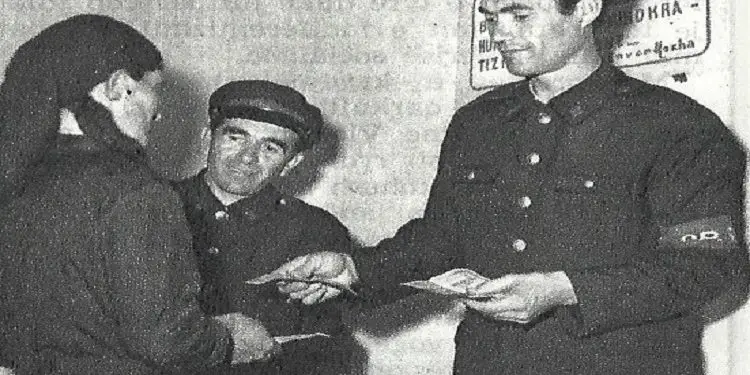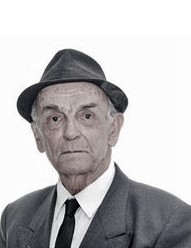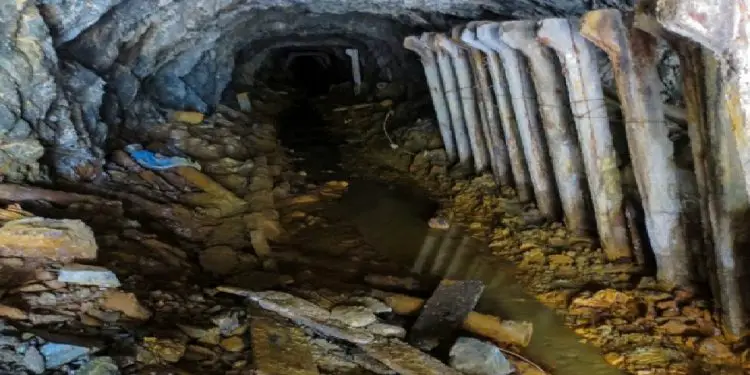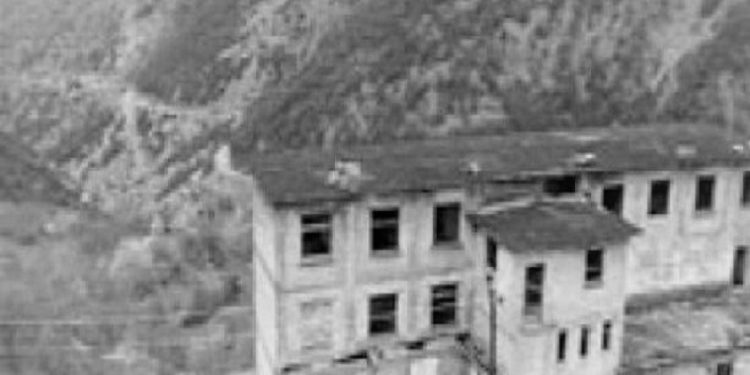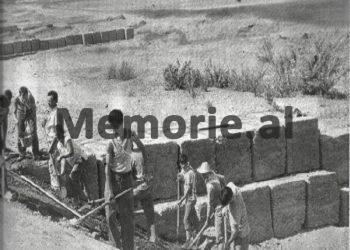By Reshat Kripa
Part fifteen
– “People who have never known dictatorship and tyranny find it easy to give in to the rhetoric about freedom, forgetting the simple and terrible reality of willful oppression where it always exists”.
Giovani Sartori: “Once again for the theory of democracy”.
Memorie.al/ Robert Krasta, had made it a habit that on every anniversary of his parents, he would go to the cemetery and place a bunch of flowers on their grave. He would look at the picture stamped on the porcelain and start a conversation with them. He had been doing this habit for a long time. The conversation seemed to soothe his soul. He told them about everything that had happened in the family. Sometimes, when he found difficulty in something, he asked them for help, and it seemed to him that they answered him. Perhaps this, could be some guess of his own, yet he believed it.
Continues from the previous issue
Finally, after ten years, three months and twelve days, the day of release came for Agron Canaj. He was sentenced to twelve years. What he had earned from his work allowed him to be released before completing his sentence. That day, they had warned him not to go to work. He was waiting to be called to go out. He waited and remembered. He remembered the ten years spent in prison.
It reminded me of the first camp, Spaçin. Two years before he went, there had been a great revolt there. For the first time in the history of forced labor camps, the flag was raised without the star of communism. He had been floating for three days. But the ferocity of the authorities had violently suppressed this revolt. Four young men had been shot and dozens more had received severe punishments.
Along with him, they had also brought Yllin, Gazmendi and Parparimin to the camp. Gjergji had been sent to Burrel prison. Agron tried to approach them, but they were very cold to him. They could not forget that he had become the cause of their doom. Even the family disaster that happened to Agron could not break this.
One day a disaster happened. The gallery collapsed and took three prisoners under it. Among them was Progress. Agron deeply felt the loss of his friend. It seemed to him that he was the cause of that death.
The only one who accompanied him was Besimi. He was an old prisoner. He was paying for the activities of his father, who had been a nationalist gang commander and who had fled abroad in 1944. Besimi had heard the rumors about Agron, but an inner voice told him that he should not be a spy like some others encountered daily in that environment. For this reason, he intervened several times with his friends to bring them closer to Agron, but everything went in vain. They didn’t back down because they didn’t back down.
Agron was one of the few who did not have any help. There was only one old mother at home, with an ordinary pension, which was not even enough for herself. In addition, she was also suffering from high blood pressure. His brother had abandoned him. Sometimes, Besimi would share something with him, when some food came to him from the family. For this, Agron was very grateful.
He had stayed in that camp for five years, when other riots occurred. A young man, a true democrat, along with two journalists were sentenced to death by firing squad, just because they had dared to write a letter to the dictator. Again, other punishments. The young Agron was not convicted, but taken to the Burrel prison.
There, among others, he found Gjergji. She approached him, spoke to him and wanted to talk to him, but he turned his back on her. He tried to explain himself. He refused. Agron retreated silently to the corner where he had his mattress. Even the other roommates, listening to Gjergji’s confession, remained cold. Only Besimi, with whom they had come together from Spaçi camp, kept him company and said:
– Don’t be upset! Days will pass and the truth will come out.
Thus, Agron needed to add to the great loneliness of the prison, the separation from his fellow sufferers.
After another two years, he was transferred to the Qafa i Bari camp. There was also a revolt there. Surprisingly, revolts followed him in every camp he went to. They had become the motto of the day for the prisoners. Three young men were shot and many more punishments.
In the camp, he found Ylli, who had been brought from Spaçi. Moreover, they assigned him to the team where he was. There were ten people. They would necessarily have contact with each other. However, Ylli continued to be cold. One day Agroni stopped him and said:
– Ylli, I want to talk to you.
– What can we talk about now that everything is over?
– I have a heavy burden on my conscience. She’s killing me. I have been tortured by her for nine years. Stefani appears to me almost every evening. I try to put him out of my mind, but he doesn’t leave me. The same goes for you with Gjergji, Gazi and Progress. You accuse me. It’s true. But can you guess under what circumstances I was to do such an act?
– Agron, leave these philosophies. What was done is no longer done.
– No, I mean it. I can no longer keep it a secret, although it is very heavy.
– Better keep it to yourself, just like until now. Maybe you can change our minds, but Stefani, can you?
He left, turning his back on her.
Thus, alone and separated from some of the prisoners, Agron, carrying the weight of betrayal and infidelity on his shoulders, spent ten years in prison, until the day of release came. Agron felt free, without having either a guard or a policeman behind his back. Now he could breathe freely.
He felt a sob that took over his soul. Lumtua and Irida appeared before his eyes. Something pierced his heart. He would not find them at home. There was only an old cuckoo who had been able to live alone, thanks to the promise she had made to her son. The day the trial ended, along with the mandate, she told him:
– I will not die until you come out.
He had kept his promise. She had lived the same as him, lonely and separated from the rest of the world. He had an accident seven years ago. A drunk had hit him with a car. Mother Gjylos’ other wounds were closed, but one of her legs was almost paralyzed. He moved with great difficulty with the help of a cane. Moreover, he was unable to go to see his son.
Their city with the camps, where her son was exiled, were far away and she could not travel by random trucks. He constantly wrote letters to her, so as not to leave her alone. He also answered once a month, as was the rule of the prison. Both had no one else to write to. Sometimes, when she overdid it, she would send him some money. That’s how those years passed.
Agron arrived late in his city. He had changed several trucks before he arrived. At that time the town clock chimed twelve times. It was midnight. The streets were deserted. Every now and then a policeman was seen on duty or someone late returning home. The mother, a few months after his sentence, was kicked out of the apartment, under the pretext that she was alone and the apartment was big. They had sent him to a room, which used to serve as a neighborhood ambulance, on the outskirts of the city. He had the address, but could not determine the building. The room was located on the first floor of a three-story building.
Meanwhile, an old man was passing by. Agron spoke to him:
– Excuse me, can you tell me where Gjylo Canaj lives?
The man stopped and was staring intently.
– What do you need, old lady? Leave him to his predicament and do not disturb him at this hour of the night. Who are you seeking at this hour?
– I am the son. I come from far away, from another world.
– Agriculture? Welcome, my son! Come on, let’s go home so you can enjoy the old desert.
– And who are you that know us so well?
– I am Syrjau, your father’s friend.
Agron remembered that it was this Syrjau who had brought the dead bodies of his father and Sabri to bury them in the city cemetery.
– Where have you been at this late hour? Agron asked him
– I was in a vacuum. A friend of mine in prison has died. But I couldn’t stay any longer. Tomorrow morning, I will go to bury him. I also have a house near here. Let’s go now, we don’t have time to chat.
They left and after a while they arrived at the house. Syrjau knocked on the gate and put Agron behind him.
– Stay here. It’s not good for your mother to see you like that suddenly. It must be prepared.
A sound of footsteps was heard from inside.
– Who is it?
– Open, it’s me Syrjau.
But the mother felt it. He felt his heart.
– Son, is that you?
– Yes, mother, me.
The gate opened and the two fell into each other’s arms. Tears were the prelude to this meeting. They had not seen each other for so many years and now they could not be separated. Seven years without meeting, like in the past when Albanians went to Yemen as soldiers and most never came back. But Agron was lucky enough to be one of the few soldiers who returned to his old mother’s bosom.
– Let’s close the gate, – said Syrjau.
They entered the only room with a door directly onto the street. In one corner there was an annex that served as a bathroom. Syrjau, as he stayed a little longer, realized that he had to go. He said hello and left.
“Come, son, finally, come,” said mother Gjyla. – I kept my word. I told you I would wait and I waited. Now even if I die, I’m not sorry.
Agron glanced at the opposite wall. A large family photograph stood there. There were three of them, Agroni, Lumtua and Irida. He put his head between his hands and started to cry. How he would like to have them right now.
– Cry son, cry! Tears relieve you. Maybe we don’t touch them. We may not see them, but they are with us. They flew into the sky to protect us.
Agron raised his head and was looking at his mother. She, the outstanding intellectual, one of the country’s first teachers, the wife of a well-known military man, had turned into a haggard old woman. Where had the beauty of that face gone? He looked from the other side of the wall. A photograph of his father with his mother stood there. They had dated the year they were married. They looked like a happy couple.
That whole night they did not close their eyes. They kept talking to each other and there was no end to their conversation.
– How did the accident happen, mother?
– I was walking on the side of the road when a car came and hit me. They said the driver was drunk. But I don’t believe it. For me he had received orders to do that action. I thought that was all I had. But no. However, I was crippled for life.
Agron once again looked at the photographs.
– How did that happen? – he asked.
– What son?
– That, the tragedy. How did they both go out one after the other?
Mother Gjyla thought before answering. His son had only been back a few hours and he didn’t want to bother him with bitter memories. But he persisted. So, he had to tell him what he knew.
– Everything started on the dark night, when they came to meet you in the Security cells, – she began. – Irida came back disfigured. Meeting you had shocked him. Doctor Sotiri visited him. He decided to put him in a psychiatric hospital. Lumtua stayed on top of his head, but he had to start work, otherwise he would be fired. After a few days came the bad news that he had been thrown from the third-floor balcony. We buried him as he deserved. Almost the whole city participated. Everyone was sorry for that loss.
On the night when the girl turned forty, Lumtua brought me a letter. He told me it was for you when you got out of prison. I told her, why would she give it to me, when she would live on her own. “No, – he told me, – give it to me, because you will live” and left wishing me good night. In the morning I waited for him to get up to go to school, but in vain. I went to the room. I found him lying on the bed lifeless. She was wearing the black dress she had bought on the occasion of the girl’s death. Beside her, on the nightstand, was an empty poison bottle. I don’t know where he found it. He looked like a sleeping angel.
The old woman got up, opened a dresser, took out a letter and with trembling hands gave it to Agron. He took it. It felt like the paper was burning his hand. Finally, he was able to open it and read:
Dear Agron!
As I write these lines, I am about to drink the deadly liquid. In the last moment of my life, I want to tell you the reason for such action. It all started the night we were taken to Security. The event didn’t end after you were kicked out. Her next act was done after we were removed from that dungeon. We fell prey to the lustful acts of those two thugs. When we escaped from that hell, the girl was mad, while I was a sinful woman.
We admitted Irida to the Psychiatric hospital. Despite the care of Dr. Sotiri and other doctors, the girl kept getting worse and worse. The only name he mentioned was yours.” The harpies kidnapped him, he said, I will fly to my father, and he did so. One day it flew off the balcony.
After a few weeks I realized I was pregnant. I had the child of a criminal in my womb. How would I get in front of people? Would I have the courage to look you in the eye? I decided to end my life. This is the only solution I have left. I’m sorry Agron: I’m sorry for what I wrote you in this letter. I embrace you forever for myself and for Rida! Memorie.al
Don `t forget us!
Your faithfulness
He got lucky
The next issue follows




